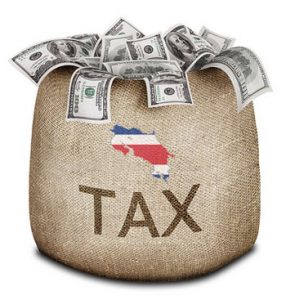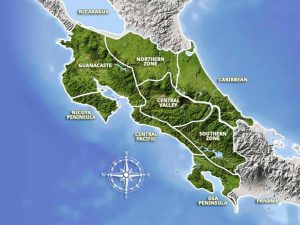If you’re enchanted with the idea of living in Costa Rica and you have an idea for a business, you’ll want to read this article! In it, we will share 10 important facts every budding entrepreneur should know about starting a business in Costa Rica.
 Costa Rica is known for its beautiful countryside and happy population. But did you know it also has excellent business opportunities?
Costa Rica is known for its beautiful countryside and happy population. But did you know it also has excellent business opportunities?
Setting up a business in a foreign country is always a daunting prospect. You will need to be well informed before starting the process. If you know what you are doing you can make the most of the many incentives for Company Incorporation in Costa Rica.
Read on, as we reveal 10 important facts every entrepreneur should know about starting a business in Costa Rica.
Table of Contents
1. Easy Visa Requirements
Costa Rica benefits from visa free access for American Citizens. This makes it incredibly easy for US citizens to set up a business.
All that is required is a valid US passport and proof of a return plane journey back to the US. It is also worth noting that you should make sure that your passport is valid for at least 6 months.
Other North American and some European countries also enjoy visa-free access. Residents can enter Costa Rica and stay as tourists visa-free for the standard 90 day period.
2. Different Immigration Statuses
If you’ve fallen for the lifestyle and culture of Costa Rica and you want to fully relocate, it is important to know the difference between Citizenship and Residency statuses.
Most people from North America will not qualify for full citizenship status. However, You can still relocate and live the normal expat lifestyle in Costa Rica with Residency status.
For those looking to invest $50,000-$200,000 in a business, you will be able to apply for temporary residency status. After a three year period, you will then be able to apply for permanent residency. Residency can also be acquired through marriage, a private property purchase of over $200,000 and investment options.
It is important to note that even if you own the company, you will likely not qualify for a work visa. This is because this will be seen as taking away jobs that could be filled by local residents.
It isn’t uncommon for many owners to remain on their tourist visas. You must leave every 30-90 days to renew the visa and stay removed from the day-to-day functions.
3. Business on Tourist Visa
You don’t need permanent residency status to start a business in Costa Rica.
With a Government keen to create jobs it is easy for non-residents to set up and start doing business. The standard 90-day tourist visa will allow you to start your own company or buy an existing one.
After the 90 day period ends, you must leave the country for at least 72 hours before you can enter again and renew your 90-day stay.
You can own a business but if you want to work there you will need a work visa or permanent residency status. If you are looking to get a work visa, this can be a little more difficult to qualify for.
To qualify for one of these visas, you will need to prove that you are filling a role that a Costa Rican citizen is unqualified to for. You also need an employer in the country to sponsor you.
4. Types of Business Structure
 When setting up your business, you will have some structures to choose from. These include general partnerships, limited partnerships, and corporations.
When setting up your business, you will have some structures to choose from. These include general partnerships, limited partnerships, and corporations.
Unless you are familiar with Costa Rican law, it is advisable to seek the advice of a local lawyer during this process. There is no “ideal” business structure. You need to review the different types and select the one most suitable to your business plan and needs.
The most used structure is “Sociedad Anonima”. This offers many of the benefits and protections that a North American or European Corporation structure offers. If you are looking to form a corporation, the cost of doing this can vary but it is safe to expect to spend up to $1000. This is the cost to have the corporation formed and then registered with the Public Registry.
5. Costa Rican Bank Accounts
If you are starting your company in Costa Rica, opening a bank account is a must. The process isn’t simple and it is important to expect a large amount of paperwork.
There is a wide choice available when it comes to banks. Worldwide banks such as HSBC, Citibank, and Scotiabank all operate in Costa Rica. They often have English speaking tellers and the lines are shorter than the public banks.
Costa Rican public banks tend to have more ATMs available and can offer state-insured deposits. Make sure you know the benefits of both types of bank before choosing the one for you.
6. You need Business Permits
Once you have a bank account and business structure, you need to apply for business permits.
The document you will need to obtain is a “Uso de Suelo” or Land Use permit which can be obtained from the local municipal office.
Along with this, you will also be provided with a list of other documentation you will need to obtain from other government bodies. This will vary depending on the type of business you are setting up and the structure.
As Spanish is the main language, the process and documentation will all be in Spanish. If you do not speak and read Spanish or you are not familiar with the system, it is advised that you hire a local to help you work through the process.
7. Free Trade Zones & Taxes
 A large benefit of setting up your company in Costa Rica is that the country has ‘free trade zones’. If your organization has fixed assets worth at least $150,000 then these zones will apply. You can also look into setting up an online business.
A large benefit of setting up your company in Costa Rica is that the country has ‘free trade zones’. If your organization has fixed assets worth at least $150,000 then these zones will apply. You can also look into setting up an online business.
This means that your organization will be exempt from taxes on imports, capital tax, income tax and also real estate tax.
Tax systems can always be confusing, and Costa Rica is no exception. Employers are expected to pay into their employees’ pension plan and public health insurance costs will apply. This is an extra 22% of salaries paid. There is also a minimum wage requirement which will need to be complied with.
Hiring an accountant to help navigate the local tax and employment laws with the government can be a great help. The accountant can fill out all the legally required paperwork and make visits to the tax administration for you. It can end up saving you money in the long run.
8. Business Incentives
As well as tax advantages, there are also a number of government incentives to take advantage of if your business fits the requirements. These incentives are normally in the form of grants and further tax exemptions. Make sure to do your research when setting up your company. Missing out on incentives is like throwing away money.
Incentivized business categories include forestry, tourism, and the agriculture sectors. Some import & exports markets are also in demand and receive similar incentives.
9. Real Estate Law
If you are looking to purchase real estate in Costa Rica, you’ll be pleased to know that foreign citizens and Costa Ricans have the same rights when it comes to property purchases and follow the same laws. The Costa Rican constitutions even protect property ownership.
As with purchasing existing businesses, you don’t need to be a citizen or have residency status to purchase property in Costa Rica. You can purchase a private dwelling on the standard 90-day tourist stay and you will own this outright.
10. Universal Healthcare
Costa Rica has a national healthcare system. The Caja Costarricense de Seguro Social, know as “Caja” is modern and regarded as one of the best models in the world.
The system is a state-run universal healthcare system with treatment available at any of the 30 hospitals and 250 clinics in Costa Rica. All citizens and legal residents get access to the system and payment comes from an income-based small monthly fee.
Tourists are eligible too, and it is important to travel with the right insurance however you will not be turned away in emergency cases.
If you are looking to live in Costa Rica and obtain legal residency status, paying into Caja is a requirement. You will not be able to get any form of residency without proving that you are paying in and have existing Caja coverage.
Starting a Business in Costa Rica
 As you can see, there is a lot to understand about setting up a business in Costa Rica, but the rewards are worth it.
As you can see, there is a lot to understand about setting up a business in Costa Rica, but the rewards are worth it.
Costa Rica is in a great location with economic, social and political stability. The highly educated workforce and location to international markets make doing business in costs Rica an attractive proposition.
Now you know how to get the most out of your investment in Costa Rica, check out our other articles on setting up a business. If you need any more information, contact us. We have everything you need to make sure your business is a great success.
Also check out how to start a business in the United Kingdom.